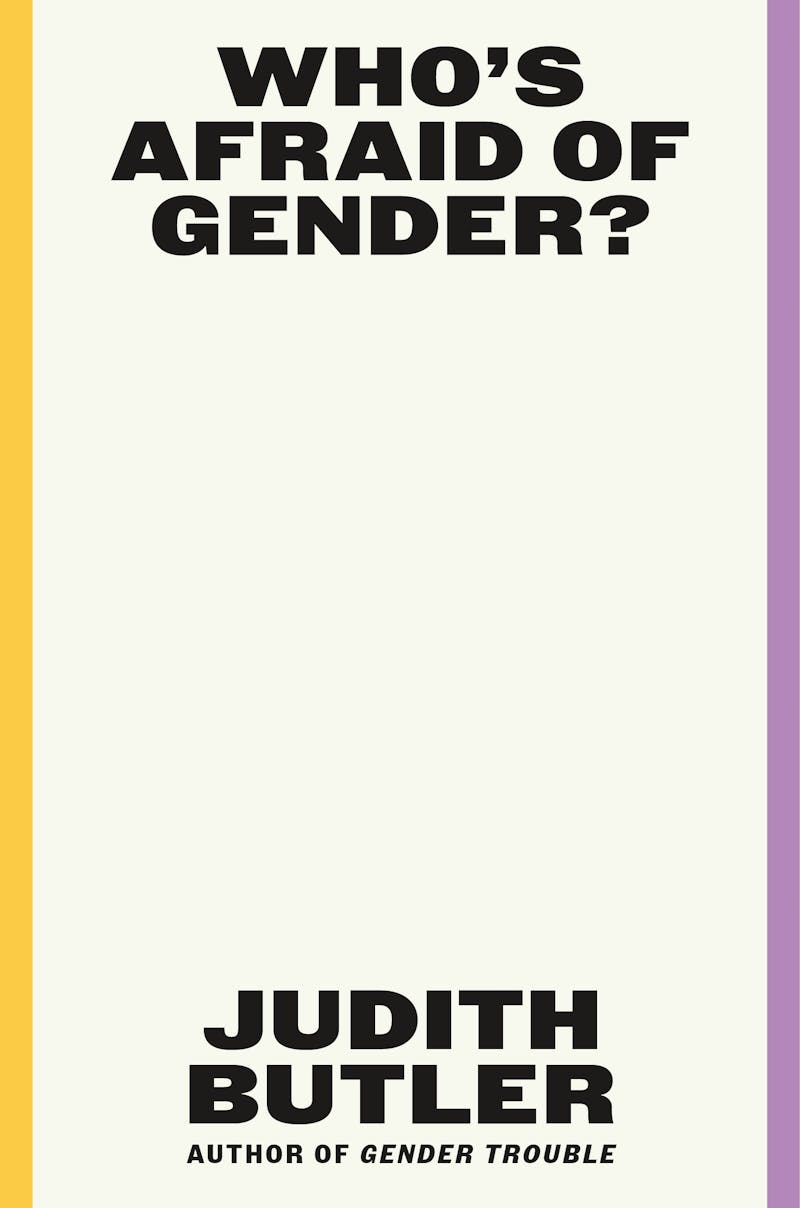Nobody is happy with the state of gender and the family right now, and you can tell a lot about a person’s politics by where they turn for solutions. Do they look to a mythical past when men were men, women were women, and daddies ruled public life? If so, you may be looking at a politically conservative person who believes in well-armed national defense, keeping immigrants out, and a wait-and-see approach to climate change. Do they aspire to a future when men and women have dissolved into an infinite spectrum of gender expression and chosen kinship has replaced the nuclear household? If so, you may be looking at a lefty who believes in universal health care, green energy, and eating the rich.
How you feel about gender is a deep thing, emotional, Freudian, tied up with one’s deepest fears and one’s most intense cravings for love and a meaningful role in society. Gender and sexuality have therefore proved an emotional entry point into politics in general—a fact that no political persuasion has capitalized on as much as rising fascist movements all over the world.

The classic fascist construction of gender is put forward by Viktor Orbán of Hungary, who has insisted that reproduction by the “natural family” is the only way to realize his vision of a strong, ethnically pure Hungarian state. In this construction, both immigrants and feminists are natural enemies. Judith Butler quotes him to set the stage in their new book, Who’s Afraid of Gender?: “In Hungary we had to build not just a physical wall on our borders and a financial wall around our families, but a legal wall around our children to protect them from the gender ideology that targets them.” He casts a fluid notion of gender as part of a new orthodoxy, which will punish dissenters—that is, those who hold with a rigid idea of sex-assigned-at-birth-and-never-changed. A recent article in Hungarian Conservative, a quarterly published by a government-funded foundation, accuses Butler of being “aggressive” toward people who don’t accept “genderism,” comparing Butler’s approach to the Hungarian Communist Party’s repression of free thought, a time when “you had to comply with the system” or a “black car could pull up to your home any time.”
The same fixation on creeping genderism has characterized several new right-wing movements. In Germany, Alternative für Deutschland, or AfD—famous for its contempt for migrants—opposes abortion, has vowed to overturn gay marriage, and advocates for a traditional nuclear family model. Italian Prime Minister Giorgia Meloni, whose Brothers of Italy party was created in the image of Mussolini’s Fascist party, has declared herself a champion of traditional motherhood, giving her small social welfare offerings a natalist bent; has railed against “the LGBT lobby”; and her administration had made moves to remove nonbiological parents from birth certificates. In France, right-wing scion Marine Le Pen, leader of the National Rally party, opposes gay marriage, though she has promised to protect France’s gay community from the supposed threat of Islamist migrants. It’s not always easy to separate these positions from the long-standing social conservativism that produced gay panic in the ’90s and anti-feminism in the ’80s, and maybe we shouldn’t—but Butler points to the right’s identification of gender itself as a problem specific to our moment.
In the United States, this fixation is familiar. The ascendant right has pushed an avalanche of anti-trans legislation in recent years, from banning gender-affirming care to restricting bathroom access to exploiting religious liberty protections to ensure that health care providers and other professionals can refuse to serve trans people. Immigration and gender remain tightly tied (recall Trump’s repulsive line that Mexican immigrants are rapists). Within the wild new right, the insistence that climate change is a hoax and critical race theory is making your kid racist sits neatly alongside claims that books about gender turn children gay, learning about sex is tantamount to sex abuse, and telling kids it’s OK to have two dads is a slippery slope to pedophilia. Moms for Liberty has set its supposedly wholesome army of caring moms against librarians who include drag story hours and Toni Morrison books in their branches. Gender and sexuality are an essential part of right-wing worldview and provide many of the movement’s most provocative rhetorical tools. We are so used to this that sometimes we fail to ask: why?
Butler has been living the battles over gender for decades. In the early 1990s, they published Gender Trouble: Feminism and the Subversion of Identity and Bodies That Matter: On the Discursive Limits of Sex, two massively influential books that challenged the supposed naturalness of sexed identity and normie sexuality. Many readers have experienced these books in contradictory ways—as rather hard to read, but at the same time moving, liberating, and a relief. Our failures to live up to our gender—to act or feel sufficiently masculine or feminine—were not ours alone! And maybe that gender could change, or be something other than male and female. While Butler regularly points out they were not the first to say that gender emerges by repeating certain actions and repressing other thoughts and actions (Simone de Beauvoir: “one is not born a woman but rather becomes one”), they are closely associated with the now-common idea that one’s gender is not a biological fact.
These books were responsive to the queer liberation and feminist movements, and Butler’s philosophical work remains connected to politics. They have explored a wide variety of topics, including the relationship between mourning and violence in post-9/11 America, the difficulty of being an ethical actor when one can barely know oneself, Palestinian liberation and Jewish ethics, and nonviolence in political struggle.
Nonetheless, it is gender that defines Butler’s fame and reputation, and gender that has placed them in a strange position among the rising fascist tides. In 2017, during a trip Butler took to Brazil to speak about democracy, right-wing Christians protested the talks, burned Butler in effigy, and hounded them at the airport. This would seem like an overwrought reception even for a prominent academic, except that rising right-wing forces all over the world, including those led by Jair Bolsonaro in Brazil (until lately), Vladimir Putin in Russia, Viktor Orbán in Hungary, and Giorgia Meloni in Italy, have begun describing a global conspiracy of “gender ideology” that they claim will destroy the family, lead to pedophilia, and broadly invite the devil to walk the earth. (Butler recalls being accused in Switzerland of trafficking with the devil.) Butler has come to feature prominently in this gender conspiracy imaginary, alongside George Soros, gender studies professors, queer activists, and feminists in general.
Where Butler’s earlier work focused on the potential for liberation, their new book is more concerned with understanding these fears. A lot of the relief that people feel reading Gender Trouble, for instance, comes from changing the relationship between their body and their identity, and being able to imagine that relationship changing over time. Conversely, the same possibility of change can have the opposite effect on those whose identity and sense of safety are based on adherence to norms. Butler refers, for example, to a speech Meloni gave in 2022, intimating that gender ideology would mean “the disappearance of women and the death of the mother.” Meloni “then called on women and mothers to rise up and fight for their ‘sexed identities.’” “If somebody tells you that your entire way of understanding your sex, your sexuality, your embodied life, is subject to destruction,” Butler has noted, “then you will respond with fear and anxiety at a somatic level.”
Fascists, Butler argues, use gender as a way of gathering up our terrifying shared problems—gaping inequality, precarity, annihilation by climate change, the constant experience or awareness of war—and then allowing us to sublimate the many horrifying structural realities of our time into an emotionally consuming distraction called gender. Butler calls this view of gender a “phantasm” with “destructive powers, one way of collecting and escalating multitudes of modern panics.” Naomi Klein recently wrote something similar about the world of online conspiracies, including conspiracies about gender, in her excellent book Doppelganger. Klein uses the term Shadow Lands to refer to the vast world of pain that we keep just outside of consciousness—the world of unregulated factories that make our clothes, meatpacking plants, melting glaciers. We respond with anxiety; but, afraid of facing the real problems, we enter the world of fantasy and abstraction.
These panics have deep emotional pull because they respond to real anxiety but are developed in particular directions by powerful international political and religious institutions with vast sums of money. Butler takes on the Roman Catholic Church throughout this book, blessedly unswayed by trendy paeans to the progressive-for-a-priest politics of Pope Francis. No friend to queers, Francis has decried “gender theory, that does not recognize the order of creation.” CitizenGO, an advocacy group started by a right-wing Catholic organization in Spain to mobilize citizens against LGBTQ and reproductive rights, has developed digital infrastructure to launch petitions and protests around the world. The entrepreneurial organization now claims to have run anti-abortion campaigns in Malawi, Niger, Tanzania, and Kenya.
Conservative religious groups have gained even more influence as cash-strapped austerity governments turn to religious organizations to fill in basic state functions (this should be familiar to any American who has visited a Catholic hospital). For example, the Ugandan government runs a precarious postcolonial economy in debt to the World Bank, the IMF, and the Chinese government. The cash-strapped state relies on international institutions to make up the difference. Evangelicals, with an energy to rival the Catholic Church, initially made headway in the country with the rise of neo-Pentecostal churches preaching a prosperity gospel. Twenty years ago, the state redirected money for HIV/AIDS treatment and education to programs sponsored by Christian organizations. George W. Bush reinforced the churches’ power by sending $8 million to abstinence-only AIDS prevention programs in Uganda that cast doubt on the effectiveness of condoms and described premarital sex as deviant. When conservative churches provide for people’s basic needs, says Butler, “matters of morality regarding sexuality and gender in this context are linked with the provisioning of basic social services, including health care. Thus, they become life-and-death issues.” Suddenly, any latent homophobia can be turbocharged by a need for survival.
In the United States, concern about “gender ideology” that mirrors that of right-wing movements around the world seems to be usurping some of the energy traditionally brought to the right by abortion battles (now a losing issue for Republicans in many places) and by gay marriage (now less controversial than it once was). Both evangelicals and the United States Conference of Catholic Bishops have taken up the fight against trans people, with a focus on what bathrooms trans people may use and limits on gender-affirming care. Butler spends a lot of time unpacking their bad-faith rhetoric here. But less ideological right-wing money also fuels anti-gender campaigns in order to elect Republicans and keep taxes low; spending too much time on their language can seem like dwelling on the suitcase holding a small nuclear bomb. The result, regardless, is a terrifying landscape in which obtaining care for one’s trans child is legally designated as abuse in right-wing rhetoric and in Texas.
“A serious harm is done to children who are denied education and care,” writes Butler. “That kind of deprivation causes psychic damage, producing a situation in which life itself becomes a form of damage from which they must escape.” These kids are sacrificed for the sake of a larger political project. The aim of censorship and bans, writes Butler, “is not just to rally the base but also to produce a form of popular support driven by a passion for authoritarian power.”
I’ve been throwing around the term fascism, but what makes these right-wing movements fascist? Butler notes that the right is engaged in a rights-stripping project to establish a new hierarchy, forcing queer people and women out of public life and criminalizing their health care. In doing so, the right advances an agenda that increases the state’s control over what we do with our bodies, what we can say and read. They have tried to consolidate their power by banning books and speech that contradict conservative views, penalizing grade schools and universities, and attempting to criminalize speech that, for example, helps people find abortions. Butler has pointed out that the right constantly accuses the left of fascism, in baffling but inflammatory ways. In Florida and Wyoming, the right has argued that gender studies courses in state-funded colleges subject students to “woke” indoctrination, and that, in order to save students, the courses must be banned. “They want to quash critical thought in the name of doctrine,” Butler writes, and “assume that their adversaries want the same.”
Of course, in reality, liberals and leftists stand in firm opposition to shrinking rights. Or do they?
Butler points out that a number of left-of-center constituencies have been susceptible to conservative arguments that certain gender identities are not valid. It is easy to find stories of parents who don’t want trans kids on certain sports teams, and the United Kingdom seems to be awash in trans-exclusionary radical feminists, or TERFs. In some cases, these positions are the result of huge right-wing investment in political campaigns. As The New York Times reported in April 2023, organizations like the right-wing American Principles Project conducted polling to figure out that framing anti-trans legislation as a way of protecting children would be most successful, and eventually found that bans on trans girls in sports polled well, in part because they could convince liberals that trans girls playing sports set back cis women’s rights.
While these debates often play out chaotically on Twitter/X, animated by anguish and anger, Butler tries to meet them with reason and research. I would offer their surprisingly quantitative section on sports to anyone struggling with questions about hormones, muscle mass, and socialization in integrating sports. They show, for example, that since many cis women have higher testosterone levels than many men, it has proved difficult for the International Olympic Committee to set guidelines defining gender by hormone measurements. In the words of the IOC’s science director, “the science has moved on.” “If we are in favor of women’s sports,” Butler writes, “and women are complex, we should be affirming that complexity.” Sports operate through social categories, not strictly hormonal ones, and always have. The idea that inclusion in sports is a threat to women rather than a recognition of women properly belongs to the right.
In a long and thoughtful chapter on the TERF phenomenon, Butler writes of the view, which TERFs share with the right, that “gender mutability is an illegitimate exercise of freedom.” By TERF logic, trans rights are seen as shrinking instead of expanding women’s rights. For example, many TERFs evoke their own traumatic experience of sexual assault and argue that allowing trans women to use women’s bathrooms places cis women at greater risk of rape. “To refuse to recognize trans women as women because one is afraid that they are really men, and hence potentially rapists,” Butler writes, “is to let the traumatic scenario loose on one’s description of reality, to flood an undeserving group of people with one’s unbridled terror and fear.” In doing so, they replace a feminist analysis of patriarchal oppression with an unreasoning politics of fear. TERFs mirror the gender phantasms of the right by singling out gender fluidity as the Big Bad in a frightening world.
Throughout the book, Butler argues for ambitious coalition-building across the left, unifying opposition to unbridled capitalism with support for the kinds of freedom human beings need to thrive: gender freedom, freedom from racism, freedom from colonial violence. This is a fraught project when such a coalition building must confront not only a better armed and monied right, but a fractious left that is scared, tired of losing, and composed of human beings raised in a highly individualistic clout-building era. Members of such a coalition may at any time decide that the more expedient move is to shed some troublesome members.
The worst possible version of this, not explicitly discussed in the book, is a coalition in which left and right agree on some social spending by shelving vexed “cultural” issues. A recent article by feminist writers Emily Janakiram and Megan Lessard identifies several efforts by conservatives to bring liberals and the left into their orbit. For example, Compact magazine, which bills itself as a populist left-right hybrid, takes a pro–social welfare, anti-abortion stance similar to Orbán’s. (Compact is functionally a successor to American Affairs, which tried this same shtick in 2017, flirting with Trump-style conservatism and publishing liberals like James K. Galbraith and John Judis and leftists like Wolfgang Streeck and Slavoj Žižek.) Compact founder Sohrab Ahmari’s book Tyranny, Inc.: How Private Power Crushed American Liberty—and What to Do About It, launched at an event with a socialist interlocutor, presents itself as a left-friendly pro-worker critique of neoliberalism, downplaying his opposition to abortion and queer politics.
Or to take a stranger example, liberal-turned-conservative concern troll Bari Weiss recently convened a panel to debate whether “the sexual revolution failed.” The panel featured socialist-left-turned-women’s-liberation-skeptic Red Scare podcast host Anna Khachiyan, musician and Elon Musk’s ex Grimes, birth control skeptic and host of podcast Maiden Mother Matriarch Louise Perry, and Ex-Muslims of North America co-founder Sarah Haider—women who draw on reactionary thought to give their gender politics a little edge. As Michelle Lhooq recently reported for Lux, the thrust of the arguments was that sexual liberation had harmed women by making sex consequence-free (i.e., one can use abortion and contraception), and the one thing they could all agree on was that the state should offer more support to mothers. Capitalizing on the star power of Grimes, the event felt like a shaky bid to make anti-abortion, natalist politics cool.
The panelists certainly have allies in the mainstream media. Elizabeth Bruenig of The Atlantic has long promoted her own brand of pronatal Catholic socialism. (Twitter bio: “Christian. Mother. Avid partisan of humankind. Usually joking.”) A couple of weeks after the Dobbs ruling, she published an essay not advocating for the rights of people to end their pregnancies, but for the pro-life movement to adopt a social welfare agenda that makes giving birth free. (Socialists, of course, have always advocated for free health and childcare—absent the forced birth.)
“Leftists need to be prepared to defend abortion rights,” say Janakiram and Lessard, “against a growing tide of self-styled radicals who effusively thunder about their support for robust social welfare programs and labor rights—at the cost of women’s bodily autonomy and financial independence from men.” Butler alluded to this trade-off in a recent interview, saying, “I think that some men who always saw feminism as a secondary issue feel much freer to voice their anti-feminism in the context of a renewed interest in socialism,” and worried about “a return to the framework of primary and secondary” forms of oppression. The fantasy that one can advance the left while catering to the gender politics of the right may be gaining traction at an alarming rate.
In order to move forward, the left needs its own compelling view of gender, as forceful, persuasive, and fully integrated as the right’s. Versions of this vision exist—in Argentina’s Ni Una Menos movement, for example, feminists (fully embracing trans feminists), unions, and racial and environmental justice activists marched together in the street, declaring their struggles linked. The movement has connected IMF debt with personal impoverishment, domestic violence, and the reduction in the social services that would allow women to be autonomous. The idea that raising queer issues will alienate the “real” working class, or that abortion is some sort of liberal issue, betrays not only a fatalism about the core goals of the left, but an ignorance of mass movements beyond U.S. borders. The Green Wave that swept Latin America over the last 15 years has advanced abortion rights there even as they’ve declined in the United States. Huge feminist movements have won the right in Uruguay, Argentina, and Mexico. U.S. abortion activists recently met in D.C. to learn from their more successful Latin American counterparts.
For a sense of how a new world might feel, what it can offer people in a dark and precarious time, we might also turn to some of the long-standing work of Judith Butler. One of the great virtues of Butler’s Gender Trouble and their subsequent work has been the incredible generosity of the vision. Every day, most of us wake up and fail to achieve our gender: One can never be feminine enough to embody the ideal woman, and if one is maximally feminine, one no longer fits into mainstream, tasteful gender expression. Abortion is a necessity and a sin. Straight and gay are impossibly cut-and-dried categories for describing the infinite weirdness and fluidity of human sexuality. Traditional gender and family have always been a myth, as can be seen from the utter failure of right-wing leaders to conform to it (AfD is led by a gay woman; Giorgia Meloni recently dumped her sexually harassing partner; Christian Republicans in Congress are affair-prone). Butler’s work has offered over and over again the basic kindness of recognizing that our painful failures to conform are what we have in common. Church, culture, and society bear down on us brutally from a tender age, and gender rebels have always been the ones who summon a world of greater mercy.




